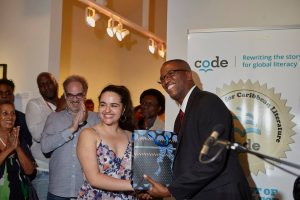Posted: May 2nd, 2017 | Author: lise | Filed under: Awards, Books, Poetry | Tags: #bocaslitfest, #caribbeanwriters, #literaryfestival, #trinidadwriters, Caribbean, Trinidad | No Comments »

#bocas2017 CODE Org Burt Award ceremony: Puerto Rican writer Viviana Prado-Núñez scooped the first prize for her self-published novel The Art of White Roses. Here she is receiving her award from Chief Justice Ivor Archie, ORTT. Photo courtesy: Marlon James/ NGC Bocas Lit Fest. (Caption taken from the Bocas Facebook page.)
This year’s NGC Bocas Lit Fest was amazing. I mean, I say that every year; the festival is such a boon to the public and the writers of Trinidad and Tobago. This year I had the pleasure and privilege of not only being a prize-winner at the festival, but I got to give a talk to secondary school students about writing; I got to judge a spoken word competition (the First Citizens National Poetry Slam), and to meet and interact with authors from around the world.
There were the regulars, with whom I have communed here and in Jamaica—the Kei Millers, Carolyn Coopers, Eddie Baughs, Monique Roffeys and Philip Nantons—they’re here at Bocas regularly, if not annually. Seeing them in the corridors of the National Library of Port-of-Spain is reassuring and delightful. They bring their grace and talent to us here and I never take them for granted.

Kei Miller giving his acceptance speech after winning the OCM Bocas Prize for Caribbean Literature. Well deserved. Photo: Marlon James/ NGC Bocas Lit Fest
This year I also got to meet new Caribbean writers like Safiya Sinclair, author of the OCM Bocas Prize for Poetry for her new collection Cannibal; and international stars like the gifted essayist Eliot Weinberger, whose essay on the stars made me hold my breath when he read it at the festival. (It’s at the seven-minute mark on the video, or thereabouts.)
https://www.facebook.com/bocaslitfest/videos/1499008553477352/
I had the enormous pleasure of seeing Trinidad Noir: The Classics celebrated in a pre-launch event where its co-editor Earl Lovelace read his indeed classic story “Jobell and America”, and where host elisha efua bartels read from her story “Woman is Boss” from the original Trinidad Noir.
I had the thrilling opportunity to meet the extraordinary young writer from Puerto Rico, Viviana Prado Nunez, whose novel The Art of White Roses won the Young Adult literature prize CODE Burt Award for Caribbean Literature (I came third in the contest with my manuscript Waiting for the Bus, and my fellow Trini Kevin Jared Hosein came second with his dark tale The Beast of Kukuyo). And the pleasure of hearing Kenyan journalist and fiction writer Peter Kimani, author of the new international hit novel Dance of the Jakaranda, read—and sing!—from this glorious, textured work.
https://www.facebook.com/bocaslitfest/videos/1498946876816853/
One of the unexpected highlights for me was judging the Slam. (I was a last-minute replacement for a judge who was unable to make it to the show.) Here were some undeniably talented young people, competing for the mindblowing prize of TT $50,000. They went all out and gave their blood, sweat and tears to the packed audience at NAPA. Happily, the audience agreed with the judges’ decision! (Head judge was the dazzling poet Anthony Joseph, with Philip Nanton, Safiya Sinclair, and UWI, St Augustine, head of the MFA programme Muli Amaye and I also on the panel.)

Congratulations to Camryn L. Bruno, winner of the Grand Slam: 2017 First Citizens National Poetry Slam Finals! Here she is, holding her $50,000 cheque, flanked by second and third place finalists Alex Stewart and Idrees Jali Saleem.
Bruno, Stewart, Saleem and their fellow finalists performed to a legion of fans, community members in the arts, and #bocas2017 attendees: the NGC Bocas Lit Fest salutes the #FCNPS2017 competitors for their bravery, talent and dedication to sharing their all on the Caribbean’s largest spoken word stage.
Photo by Marlon James, official Bocas Lit Fest photographer.
(Caption taken from the Bocas Facebook page)
Bocas is a gift. I am thankful.
Posted: July 10th, 2012 | Author: lise | Filed under: Column | Tags: Backpack Project, Caribbean, education, Guyana, poverty alleviation, Trinidad | No Comments »
Free education is not free. Though in principle all children in Trinidad and Tobago have access to free schooling, not all of them can afford to take up the offer. Government already provides free textbooks, breakfast, lunch, and tuition, you might note, and it is up to parents to provide the other necessities for attending school. Yet, it’s not always easy for parents to do so. As a parent myself I can tell you the cost of outfitting a child for school is high, even with all the above provided free. Each child has to have a book bag, for one. Textbooks might be free but stationery isn’t, and you might cast your own mind back to your days in uniform to remember what it was like to forget a copybook at home, or to not have a copybook at all. Even apart from other things like uniforms and shoes, there are also personal hygiene requirements like deodorant, soap, toothpaste and a toothbrush, without which a child would be embarrassed to sit in class or might even be put out of class in some situations.
Recognising this, a group of young people has sought to help some Caribbean children seize free education. Melissa Enmore and Michelle Kandasammy have come up with The Backpack Project, a non-profit that aims to provide assistance to needy children by giving them a backpack full of stationery and personal care supplies once a year.
“The Backpack Project believes that education is a basic human right, not a privilege, and that health is a key factor determining the success of a child’s development,” the Project says in its Mission Statement. “The organisation will encourage the pursuit of formal education amongst underprivileged children in the Caribbean by providing basic school supplies and foster a healthy learning environment by providing personal supplies to backpack recipients. The Backpack Project hopes to leverage the resources of its sponsors, donors, volunteers and other stakeholders in a collaborative manner to further its objective of universal childhood education in the Caribbean.”
I find it personally heartening that the Project has not only been able to do its work in Guyana (where Enmore and Kandasammy are from) and Trinidad (where Kandasammy lives), but also extend it to Haiti and the Philippines in two special programmes. The Project sends filled backpacks to students, shipping them in a barrel where necessary. The students, aged five to 18, are identified by educators and through individual requests, and must agree to have their school careers tracked as long as they participate in the Project. So far the Project has given over 100 backpacks to Trinidadian and Guyanese students since it was formed. With the help of the public, they can give more.
The Backpack Project is in the middle of a collection drive, which ends August 18. Members of the public can give either cash or kind: sponsor a filled backpack, which costs about $515, or donate the items needed to fill one. (Cash donors can also give part of the cost of a filled backpack.) The Project still needs for this year: 60 pens, 40 pencil cases, 24 drawing books, 25 bottles of shampoo, 25 bottles of conditioner, 60 notebooks, brown paper, 50 tubes of toothpaste, and 50 toothbrushes.
Kandasammy said in the organisation’s December 2011 newsletter, “Nothing quite prepares you for the joy on the children’s faces when they see the bags with their names on [them]. The warm unexpected hugs received from the students of Rose Hill RC took me by surprise. After briefly talking to the students about their classes and their goals for the year… I walked out of Rose Hill RC more determined than ever that we must fulfil our promise to continue to sponsor all of our kids and to expand our programme.”
In this region so fraught with inequity, poverty and poor governance, it is easy to throw one’s hands up and surrender to the apathy of selfishness, doing for oneself and ignoring others’ problems. It is much harder to engage with those problems, to sit and consider how one can actually make a difference in the world in which we live, and particularly the country we inhabit. It is refreshing to encounter people who try to change things for the better. The Backpack Project is one ogranisation of a group of young people who are doing just that. Join them.
To give to The Backpack Project, a registered not-for-profit company, go to: www.backpackproject.ca or email thebackpackproject@gmail.com. You can also call Michelle Kandasammy at 781-4034 or Karelle Clark at 497-4847.
The Backpack Project Newsletter Dec 2011 compressed (1)
[This appeared in the Trinidad and Tobago Guardian as my column for July 10, 2012.]
Posted: February 16th, 2011 | Author: lise | Filed under: Column | Tags: law, LGBT rights, oppression, society, Trinidad, Trinidad and Tobago, Trinidad Guardian, words | 7 Comments »

This morning I read a story in the T&T Guardian about a discussion in the Senate regarding same-sex marriage. The story says, in part, “Finance Minister Winston Dookeran said the issue of same-sex marriages was something Parliament would have to adjudicate upon at some time. He said there were laws on the books concerning co-habitation and ‘we don’t want to contradict one piece of legislation with another.'”
Discussion on Facebook this morning after I posted the link naturally turned to the archaic laws regarding buggery: how could we think about same-sex marriage when it is still illegal for men to have sex with men? What is a marriage for?
As the Finance Minister alluded, one must wonder whether existing laws on marriage or common law relationships–including the disposal of property and estates in inheritance law–would need to be amended before same-sex marriage could be legally countenanced in Trinidad and Tobago.
I looked it up. While the Marriage Act 1996, which you can find here on a list of our laws, does not seem to explicitly define the genders of the “parties” it mentions, the Cohabitational Relationships Act of 1998 does. That Act defines “cohabitant” as:
(a) in relation to a man, a woman who is living or has lived with a man as his wife in a cohabitational relationship; and
(b) in relation to a woman, a man who is living with or has lived with a woman as her husband in a cohabitational relationship;
‘cohabitational relationship’ means the relationship between cohabitants, who not being married to each other are living or
have lived together as husband and wife on a bona fide domestic basis”.
It also occurred to me that the Domestic Violence Act of 1999 also would need to be changed because it, too, defines a cohabitant as ” a person who has lived with or is living with a person of the opposite sex as a husband or wife although not legally married to that person”.
So it’s great that we have begun to think about the question of same-sex marriage in Trinidad and Tobago. However, we have a long way to go–legally as well as socially–before we can make it an option for our people.
(After this first was posted I got a couple of questions asking me which side I was on. This column I wrote in the T&T Guardian two years ago is pretty clear on that issue.)
Posted: August 13th, 2010 | Author: lise | Filed under: Editorial | Tags: family, parenting, Trinidad | 6 Comments »
 So the last few weeks of my life–nearly a month, now–have been consumed with moving house.
So the last few weeks of my life–nearly a month, now–have been consumed with moving house.
I lived in Diego Martin for about six years and my rent increased pretty much annually. This year I knew I had to make some changes, because, despite quitting my regular job to take a chance on the NGO I founded, I plan to send my elder daughter off to school in Foreign. Do the maths: less income and more expense. Something had to give and that something turned out to be rent.
My new apartment is still a work in progress. It is a two-bedroom in Petit Valley (in the kind of neighbourhood that had the kind TSTT lady saying, when I called to change my service address, “You sure you want to live there?”) and so far, so good. My younger has school friends in the area and, to be honest, once the DVD player and the computer are working, she’d live in the pit of hell for all she cares. My elder, ditto, except you can substitute flushing toilet for DVD player.
We haven’t fully unpacked yet. The dozens of boxes, bin liners and reusable HiLo bags into which I packed up my life are mostly empty, but since one of things we haven’t got yet is shelving, there are some key items still wrapped up in cardboard and packing tape. The amenities are not what I’m used to, but then I have to remind myself that I grew up sharing a bedroom with two sisters, my mother and my brother, without indoor plumbing or a TV for most of my childhood. It’s all relative. You’d be amazed at what you can get used to, either way.
As I wait for the completion of our apartment, grimy from concrete dust and ducking the damned bat that refuses to understand that humans live here now, I count my blessings. Health, happiness, a life mission, good friends and a lot of family support are not all I have. I also have a roof over my head–even if I do have to share it with the bat for now.
Posted: May 22nd, 2009 | Author: lise | Filed under: Books | Tags: Akashic Noir, Anthology, Editor, Noir, Trinidad | 1 Comment »
Named one of the Best Books of 2008 by the Caribbean Review of Books
Trinidad Noir
edited by Lisa Allen-Agostini & Jeanne Mason
Mystery/Fiction Anthology | A Trade Paperback Original
ISBN-13: 978-1-933354-55-2 l 300 pages | $15.95
Published by Akashic Books as part of their award-winning Akashic Noir series, Trinidad Noir brings together the best writers in Trinidad & Tobago and an exciting genre.
Trinidad Noir features new stories by: Robert Antoni, Elizabeth Nunez, Lawrence Scott, Ramabai Espinet, Shani Mootoo, Kevin Baldeosingh, Vahni Capildeo, Willi Chen, Lisa Allen-Agostini, Rian Marie Extavour, Keith Jardim, Jaime Lee Loy, Darby Maloney, Reena Andrea Manickchand, Judith Theodore, Tiphanie Yanique, and others.
Akashic Noir was launched with the best-seller Brooklyn Noir. Each of the titles in the series features original noir stories, each one set in a distinct neighborhood or location within the city of the book.
Trinidad Noir is the first book in the series to be set in the English-speaking Caribbean.
“Trinidad Noir delivers all the crime a reader expects from Akashic’s Noir Series: murder, kidnapping, rape, drugs, prostitution, theft, extortion, and more. Yet in fictionalizing crime in the real crime setting of Trinidad, acclaimed authors Lawrence Scott, Robert Antoni, Elizabeth Nunez, Ramabai Espinet, Keith Jardim, Tiphanie Yanique, Willi Chen, and others have created a decidedly literary noir collection,” says the Akashic Web site. “These authors’ quality characterizations, plots, and styles concurrently reveal the country’s darkness and its appeal with an unexpected and gratifying result: In their captivating and occasionally humorous stories, the Trinidad that emerges is as intriguing and contradictory as the island and its people. Trinidad Noir is as much a delightful crime romp as it is an expose of the seedy side of life.”
Co-editor Jeanne Mason is a freelance editor who also writes short stories and poetry. She has lived in Paris, France, where she edited medical articles for US and UK journals. She currently resides in Trinidad & Tobago.




